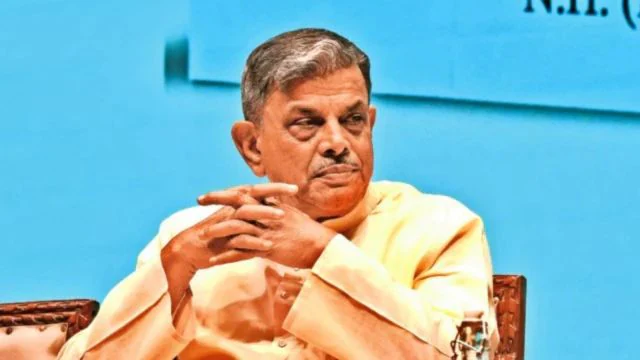
RSS leader Dattatreya Hosabale calls for removing “socialist” and “secular” from the Constitution’s Preamble, BJP heavyweights including Dhankhar, Shivraj, and Himanta echo support
The Ideological Earthquake: Hosabale’s Call and the Domino Effect
The ideological pot was stirred when RSS general secretary Dattatreya Hosabale reignited a long-dormant debate: should the words “socialist” and “secular” remain in the Preamble of the Indian Constitution? His argument that these terms were inserted during the Emergency under questionable democratic circumstances wasn’t new, but the timing and the chorus of support it received made it explosive.
Vice President Jagdeep Dhankhar, speaking at a public event, called the Emergency-era additions a “festering wound” and a “sacrilege to the spirit of Sanatan.” Assam Chief Minister Himanta Biswa Sarma went further, labeling socialism and secularism as “Western concepts” alien to Indian civilization. Union Minister Shivraj Singh Chouhan echoed the sentiment, declaring that “secularism is not the core of our culture.”
The statements, while politically charged, were not off-the-cuff remarks. They were part of a coordinated ideological push that seems to be gaining traction within the BJP and its ideological parent, the RSS. But in their zeal to challenge the Preamble, these leaders may have overlooked a critical irony: the BJP’s own constitution mandates allegiance to the very principles they now seek to discard.
The BJP’s Founding Paradox: When Ideology Meets Inconvenience
Article II of the BJP’s constitution states that the party shall bear “true faith and allegiance to the Constitution of India as by law established and to the principles of socialism, secularism and democracy.” This clause, printed on the very first page of the party’s foundational document, is now at odds with the public posturing of its top leaders.
This contradiction has not gone unnoticed. Political observers and constitutional scholars have pointed out that while the BJP may ideologically oppose the Emergency-era amendments, it remains legally and morally bound by its own charter. The party’s silence on this internal inconsistency has only amplified the perception of opportunism.
The situation is further complicated by the fact that the BJP has never formally amended its constitution to remove or reinterpret these terms. So while its leaders rail against “secularism” and “socialism” in public forums, the party continues to function under a document that enshrines those very ideals.
This dissonance raises a fundamental question: Is the BJP ready to walk the talk and amend its own constitution? Or will it continue to straddle the ideological fence, embracing selective outrage while ignoring internal contradictions?
Modi’s Dilemma: Rewrite the Rules or Rein in the Rhetoric?
For Prime Minister Narendra Modi, the current debate presents both an opportunity and a challenge. On one hand, aligning the BJP’s constitution with its ideological stance could consolidate the party’s base and signal a bold redefinition of its political identity. On the other, such a move risks alienating moderate voters and inviting legal scrutiny.
Modi has often spoken about the importance of “fundamental duties” and the need to revisit the legacy of the 42nd Amendment. Yet, he has remained conspicuously silent on the latest controversy. This silence could be strategic, allowing the ideological debate to play out organically before the party takes a formal position.
However, the pressure is mounting. With senior leaders openly questioning the legitimacy of the Preamble’s language, the BJP may soon be forced to confront its own constitutional paradox. Amending the party’s charter would require a national executive meeting and a two-thirds majority, procedurally feasible, but politically sensitive.
Moreover, any attempt to amend the national Constitution would require a two-thirds majority in Parliament and ratification by at least half of the states. Given the current political landscape, such a move would be fraught with resistance and could trigger a constitutional crisis.
In the meantime, the BJP’s ideological tightrope walk continues. The party’s leadership must now decide whether to recalibrate its rhetoric or realign its rules. Either way, the outcome will have far-reaching implications, not just for the BJP, but for the ideological soul of Indian democracy.
Stay updated with the latest news on Rapido Updates. Keep yourself updated with The World, India News, Entertainment, Market, Automobile, Gadgets, Sports, and many more